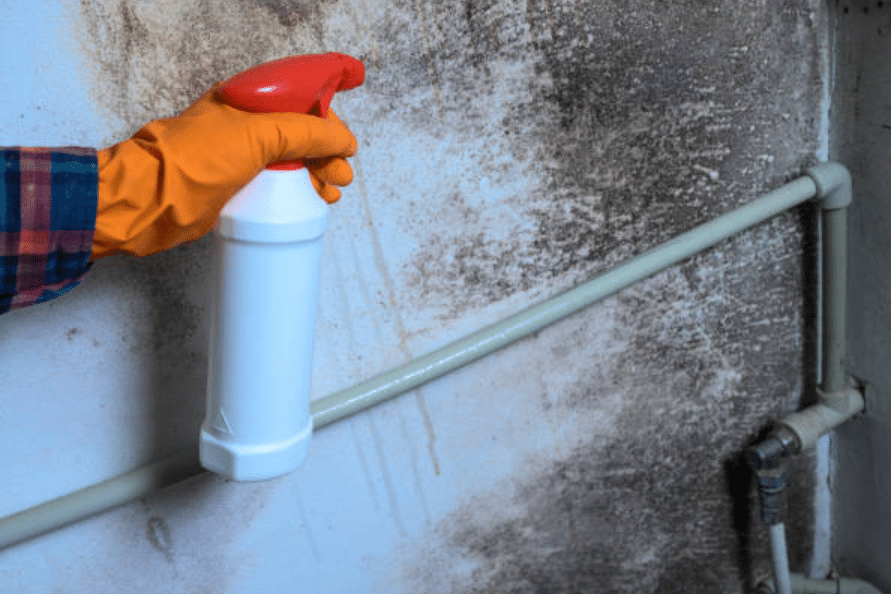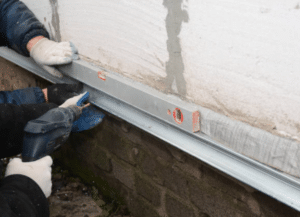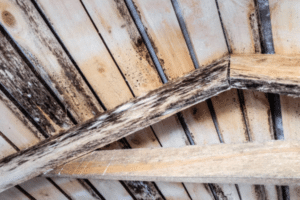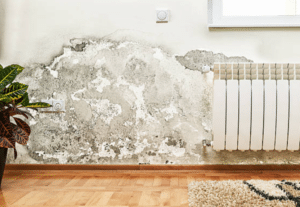When it comes to combatting mould in your basement or cellar, there are important factors to consider for effective remediation and protecting your home’s health.
Mould growth in these areas can pose serious health hazards and lead to structural damage if left untreated. It’s crucial to take the necessary steps to combat mould and ensure a safe and healthy environment in your home.
In this article, we’ll look into options in preventing mould growth and its cost. We’ll look into ways to address mould problems and on how to use professional mould specialists to handle mould in basement and cellars.
Key Takeaways:
- Basement mould remediation is essential to protect your health and prevent further damage to your home.
- Professional basement mould removal services, like AirFresh Mould Removal London, should be considered for safe and effective remediation.
- Basement waterproofing is a key factor in preventing mould growth, with costs ranging from £2,300 to £7,575 depending on various factors.
- Damp proofing is a cheaper alternative to basement waterproofing, costing between £3 and £6 per square foot.
- Moisture control, including the use of subfloor systems like AmDry, is important for preventing mould in basements and cellars.
By addressing these considerations and utilising professional services and products, you can effectively combat mould in your basements and cellars, ensuring a safe and healthy living environment for you and your family.
Data and Studies on Mould in UK Homes
Mould is a common problem in basements and cellars, especially in the UK. In fact, a study by the UK government found that 1 in 5 homes in the UK has a damp or mould problem. This is due to a number of factors, including the damp climate, the age of many UK homes, and the fact that basements and cellars are often poorly ventilated.
In a study by the UK government found that 1 in 5 homes in the UK has a damp or mould problem.
The study by the University of Exeter found that mould exposure can damage property worth up to £1 billion each year in the UK.
Basement Mould Remediation: Steps To Remove Mould
If you have mould in your basement or cellar, it is important to take steps to remove it as soon as possible.
There are a number of things you can do yourself, but it is often best to call in a professional mould remediation company. Here are some tips for combating mould in basements and cellars:
Identify and fix the source of moisture. Mould cannot grow without moisture, so it is important to identify and fix any leaks or other sources of moisture in your basement or cellar.
Reduce humidity levels. Mould thrives in humid environments. You can reduce humidity levels in your basement or cellar by using a dehumidifier, installing a ventilation system, and opening windows on dry days.
Clean and disinfect mouldy surfaces. Once you have fixed the source of moisture and reduced humidity levels, you need to clean and disinfect any mouldy surfaces. This can be done with a mixture of bleach and water or a commercial mould remover.
Remove mouldy materials. If mould has grown on porous materials, such as wood or drywall, you may need to remove them. This is a job best left to a professional.
Once you have removed the mould, it is important to take steps to prevent it from coming back. This includes keeping humidity levels low and repairing any leaks or other sources of moisture. You may also want to consider using a mould inhibitor.
Understanding the Importance of Professional Mould Remediation
Hiring a professional mould remediation company is vital for effectively tackling the presence of mould in your basement or cellar.
When it comes to mould removal, it’s crucial to rely on the expertise and specialised equipment that these professionals bring to the task.
Attempting to remove mould on your own can be hazardous to your health and potentially lead to the spread of mould spores throughout your home.
Professional mould remediation services ensure thorough and safe removal of mould from your basement or cellar.
These experts have the necessary knowledge and experience to identify the root cause of the mould growth and implement effective remediation techniques.
They use advanced equipment and techniques to not only remove visible mould but also address hidden mould and prevent future growth.
By hiring a reputable mould removal company, you can rest assured that the mould problem in your basement or cellar will be effectively resolved.
These professionals follow industry best practices and safety guidelines to protect your health and restore the air quality in your home. They also provide valuable advice on how to prevent future mould growth, including proper ventilation and moisture control.
Benefits of Professional Mould Remediation:
- Thorough and safe removal of mould
- Identification and mitigation of the root cause
- Utilisation of advanced equipment and techniques
- Restoration of air quality
- Expert advice on prevention of future mould growth
When it comes to combatting mould in your basement or cellar, entrusting the job to professional mould remediation experts is the wisest choice.
Their expertise, specialised equipment, and adherence to industry standards ensure effective and safe mould cleaning service, restoring a healthy living environment in your home.
| Factors | Average Cost (£) |
|---|---|
| Size of the basement | 2,300 – 7,575 |
| Interior vs exterior sealing | Varies |
| Type of sealant used | Varies |
| Labor cost per square foot | 3 – 8 |
| Geographic location | Varies |
Basement Waterproofing and Damp Proofing: Factors and Costs
Basement waterproofing and damp proofing are essential to combat mould growth in basements and cellars, and understanding the factors and costs involved is crucial. The cost of basement waterproofing can vary depending on several factors.
On average, the cost ranges from £2,300 to £7,575, with an average cost of £4,920. The size of the basement is one of the main factors influencing the cost, as larger basements require more materials and labor.
Another important factor is the method of sealing, whether on the inside or outside. Interior sealing tends to be less costly, while exterior sealing provides additional protection but can be more expensive. There are also different types of sealants that can be used, such as acrylic, epoxy, and silicate, each with its own cost.
Labour is another significant factor in the overall cost of basement waterproofing. Contractors typically charge between £3 and £8 per square foot for their services. The geographic location can also impact the cost, with higher costs in flood-prone areas.
Other considerations include the condition of the foundation, the age of the home, and the need for any repairs. It’s important to take all of these factors into account when planning for basement waterproofing.
| Factors | Average Cost (£) |
|---|---|
| Size of Basement | £2,300 – £7,575 |
| Method of Sealing | Varies |
| Type of Sealant | Varies |
| Labour | £3 – £8 per sq ft |
| Geographic Location | Varies |
Moisture Control with AmDry Subfloor System
When it comes to basement finishing, moisture control is of utmost importance to prevent mould growth. One effective solution is the use of a subfloor system like AmDry.
This DIY-friendly option not only provides insulation but also protects against moisture. By creating a barrier between the concrete floor and the finished flooring, AmDry helps to prevent water vapor from seeping through and causing damage.
The AmDry subfloor system is designed to allow air circulation, which helps to further control moisture levels.
By reducing the risk of dampness and water damage, it significantly decreases the chances of mould growth. With the right considerations and products like AmDry, homeowners can effectively combat mould in their basements and cellars.
It’s important to take a proactive approach in addressing mould issues in basements and cellars. By investing in proper basement waterproofing, damp proofing, and moisture control solutions, homeowners can create a healthy and mould-free environment for their families.
Consulting with mould experts in London, such as AirFresh Mould Removal, can provide valuable guidance and assistance in tackling mould problems effectively.
Moisture Control and the Role of Subfloor Systems
Ensuring effective moisture control is a key aspect of preventing mould in basements and cellars, and subfloor systems play a vital role in achieving this goal. When it comes to basement mould prevention, addressing moisture issues is paramount.
Excess moisture can seep into the basement, creating a conducive environment for mould growth. To combat this, homeowners need to implement reliable moisture control measures.
One popular option for moisture control is the use of subfloor systems, with AmDry being a trusted choice. AmDry is a DIY-friendly solution that provides insulation and protection against moisture.
It consists of interlocking panels that create a barrier between the concrete slab and the finished flooring. This helps to prevent moisture from penetrating the floor, reducing the risk of mould development.
Using a subfloor system like AmDry offers several advantages. Besides moisture control, it also provides thermal insulation, making the basement more comfortable. Additionally, it helps to reduce sound transmission, creating a quieter environment.
The DIY-friendly nature of AmDry allows homeowners to install it themselves, saving on labor costs. However, it is essential to follow the manufacturer’s instructions carefully to ensure proper installation and effectiveness.
Moisture Control Checklist:
- Inspect the basement for any signs of water leakage or moisture accumulation.
- Address any identified issues promptly, such as fixing leaking pipes or repairing foundation cracks.
- Consider installing a dehumidifier to regulate humidity levels in the basement.
- Implement proper ventilation to allow for air circulation and prevent condensation.
- Install a reliable subfloor system like AmDry to create a moisture barrier.
By following these moisture control measures and utilising subfloor systems, homeowners can effectively prevent mould growth in their basements and cellars.
Remember, combating mould requires a holistic approach that includes moisture control, timely repairs, and the use of appropriate products like subfloor systems.
With the right considerations and measures in place, you can create a healthy and mould-free environment in your basement.
| Factors affecting the cost of basement waterproofing: | Average cost range (£) |
|---|---|
| Size of the basement | £2,300 – £7,575 |
| Interior vs exterior sealing | £2,300 – £7,575 |
| Type of sealant used (acrylic, epoxy, silicate) | £2,300 – £7,575 |
| Labour | £3 – £8 per square foot |
| Geographic location | Varies |
Conclusion
Combatting mould in basements and cellars requires a combination of professional expertise, proper waterproofing and damp proofing, and effective moisture control, all of which can help protect your home’s health.
Mould growth in basements and cellars can pose serious health risks, including respiratory issues, allergies, and even structural damage to your property.
To effectively combat mould, it is crucial to hire professionals for mould remediation. Attempting to remove mould yourself can be risky, as it may result in the spread of mould spores and further contamination.
AirFresh Mould Removal London offers reliable and efficient mould remediation services, ensuring a safe and thorough removal of mould from your basement or cellar.
Basement waterproofing and damp proofing are also essential in preventing mould growth. The cost of basement waterproofing varies depending on factors like the size of the basement, the method of sealing (interior or exterior), and the type of sealant used.
On average, basement waterproofing can cost around £4,920. However, if your budget is limited, damp proofing is a more affordable option, costing between £3 and £6 per square foot.
Moisture control is another crucial aspect of preventing mould in basements and cellars. A subfloor system like AmDry can provide insulation and protection against moisture, making it an ideal solution for basement finishing. AmDry is DIY-friendly, allowing homeowners to address moisture issues before completing their basement renovation project.
Don’t let mould take a toll on your home’s health. Take action now by contacting AirFresh Mould Removal London at 0203 130 4068 for professional mould remediation services.
With their expertise and effective solutions, you can ensure a mould-free and healthy environment in your basement or cellar.
FAQ
Q: What is the average cost of basement waterproofing?
A: The average cost of basement waterproofing ranges from £2,300 to £7,575.
Q: What factors affect the cost of basement waterproofing?
A: The size of the basement, interior vs exterior sealing, and the type of sealant used are factors that affect the cost of basement waterproofing.
Q: How much does damp proofing cost?
A: Damp proofing costs between £3 and £6 per square foot.
Q: What factors affect the cost of damp proofing?
A: The size of the basement and the method of sealing, either on the outside or inside, affect the cost of damp proofing.
Q: What are the different types of sealants used for basement waterproofing?
A: The three types of sealants used for basement waterproofing are acrylic, epoxy, and silicate.
Q: How much do contractors charge for basement waterproofing labor?
A: Contractors charge between £3 and £8 per square foot for basement waterproofing labor.
Q: Does the geographic location impact the cost of basement waterproofing?
A: Yes, the cost of basement waterproofing can be higher in flood-prone areas.
Q: What are some other considerations for combatting mould in basements and cellars?
A: Other considerations include the condition of the foundation, the age of the home, and the need for repairs.
Q: What is a subfloor system and how can it help with moisture control?
A: A subfloor system, such as AmDry, is a DIY-friendly option that provides insulation and protection against moisture in basement finishing.
Q: How can homeowners effectively combat mould in basements and cellars?
A: By considering factors such as professional mould remediation, basement waterproofing, damp proofing, and moisture control, homeowners can effectively combat mould in basements and cellars.
There are some things you should never attempt to do yourself, such as removing mould from insulation or drywall. If you have a serious mould problem, it’s always best to call a professional mould remediation company.
If you have any concerns about mould in your basement or cellar, please don’t hesitate to contact us today. Call us on 0203 130 4068 to get started.





